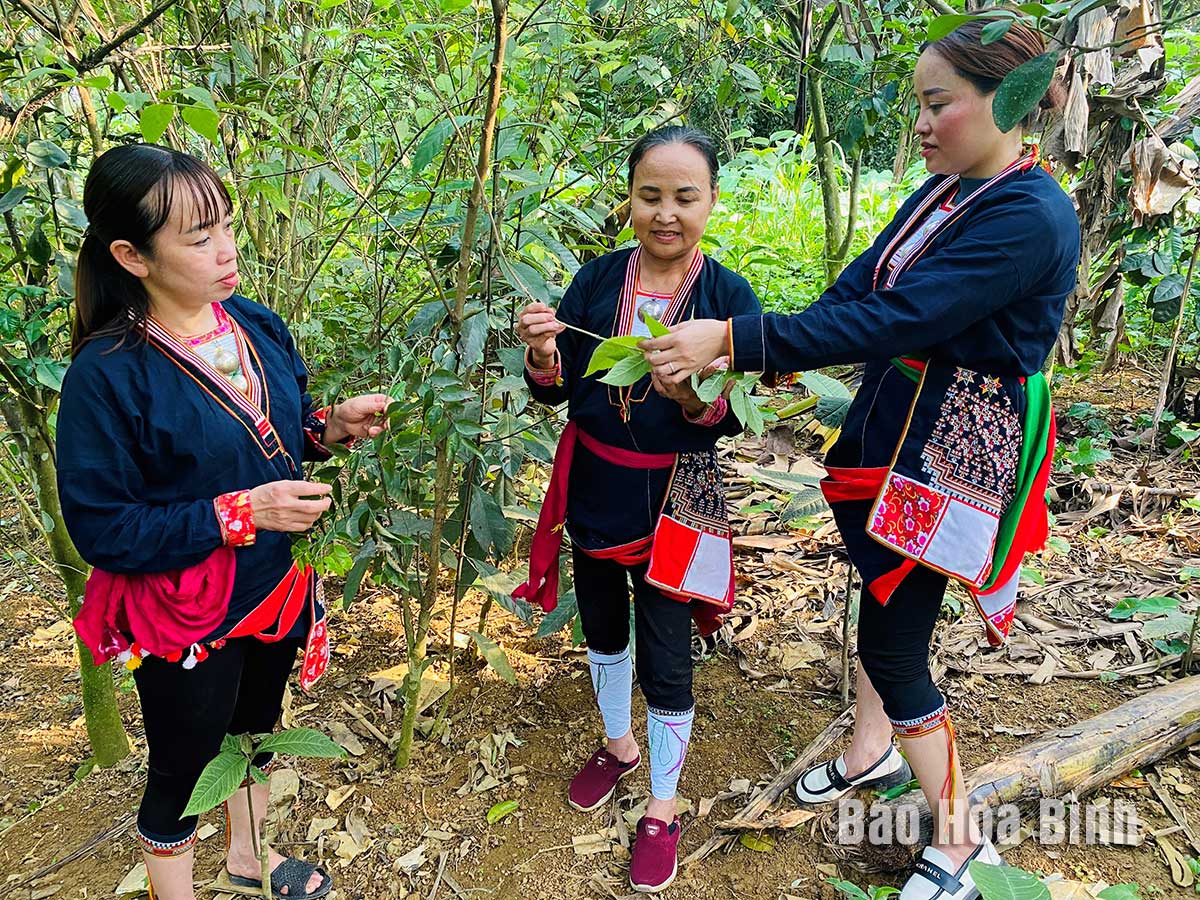
With rich knowledge of medicinal materials in nature, Dao ethnic minority people in Tu Son commune of Kim Boi district have practiced traditional medicine for generations and brought their long-standing therapies into play in the current life.
Phung Thi Hien (first, right), a resident in Thung Dao
Bac hamlet of Tu Son commune (Kim Boi district), introduces precious medicinal
plants of the Dao ethnic minority group.
Phung Thi Hien was born to a family having four
generations practicing traditional medicine in Thung Dao Bac hamlet of Tu Son
commune. After graduating from high school, she enrolled on the Tue Tinh
traditional medicine school with the hope of preserving traditional remedies
and adding new knowledge to her ethnic group’s remedies.
After nearly 20 years of working and gaining
experience, now she has wide knowledge of over 120 medicinal materials and a
number of remedies for bone, joint, stomach, liver, and kidney illnesses, among
others.
Hien said she had learnt those remedies from her
mother. Each remedy contains tens or even hundreds of herbal ingredients.
Patience, prudence, and wholeheartedness are needed to practice traditional
medicine. Sometimes, it takes even months in forest to seek enough ingredients
for a remedy.
To develop medicinal plants for use in the Dao
people’s traditional remedies and also create jobs and improve the life quality
in Thung Dao Bac, Hien established Phung Gia (Phung Family) traditional
medicine cooperative with seven members in 2019. Since the cooperative’s
inception, local residents have replaced traditional crops with medicinal
plants as natural resources are limited and they also want to preserve the
precious genetic sources in the face of overexploitation.
The cooperative sold its products mainly in the
northern region, especially Hanoi, Hung Yen, and Vinh Phuc, earning more than 3
billion VND (119,500 USD) in total revenue in 2023.
To scale up production, in April 2024, the Phung
Gia traditional medicine cooperative was dissolved to establish the Thien Nam
Green Herbs Co. Ltd., based in Ve hamlet of Dong Bac commune, Kim Boi district.
The company is applying high technology to improve product quality, promoting
activities under production chain, and aligning medicinal plant cultivation
with market demand, thus working towards the sustainable development of traditional
medicine.
Bui Van Lam, Vice Chairman of the People’s
Committee of Tu Son commune, said to preserve the traditional medicine of the
Dao people and build a brand, the local Party Committee and administration will
conduct a survey of medicinal plants in forest and step up communications to
encourage local residents to join hands in preserving and developing the
valuable plants.
Aside from curing illnesses, traditional
medicine also helps the Dao people improve their income and quality of life.
However, authorities and the community still need to give more attention and
support so as to sustainably develop medicinal plants and generate better
economic benefits for local residents, he added.
Phong Phu commune, Tan Lac district of Hoa Binh province, is widely regarded as the cultural heartland of the Muong ethnic group. Among its many traditional communities, Luy Ai hamlet (formerly Ai hamlet) stands out as a rare location where the customs and way of life of the Muong Bi people remain largely intact.
The Truong Kha temple festival, a distinctive cultural event held every three years in Vu Ban township, Lac Son district, returned recently with vibrant rituals and folk traditions of the Muong people. Located next to the Buoi River in the Muong Trao fields, the Truong Kha Temple is dedicated to the three Kun Dol deities, revered for teaching farming techniques, irrigation, weaving, and protecting the harvest.
The demand for spaces serving community activities of residents in various areas across Hoa Binh city has been satisfied as local cultural houses now feature modern, spacious facilities thanks to the effective implementation of Resolution No. 49/NQ-HDND issued on December 28, 2021 by the city People's Council, which approved the plan for reorganising, converting, and allocating land for the construction, repair, and expansion of cultural houses in Hoa Binh’s villages and residential areas until 2025.
At the end of May, the Hoa Binh Provincial Ethnic Arts Troupe organized a series of performances for residents in Region 2 and Region 3 communes across the province. Bringing art to ethnic communities in remote, isolated, and especially disadvantaged areas has become a meaningful activity. These are not merely artistic performances but also journeys to disseminate cultural values, enrich spiritual life, and contribute to preserving the cultural identity of ethnic minorities.



